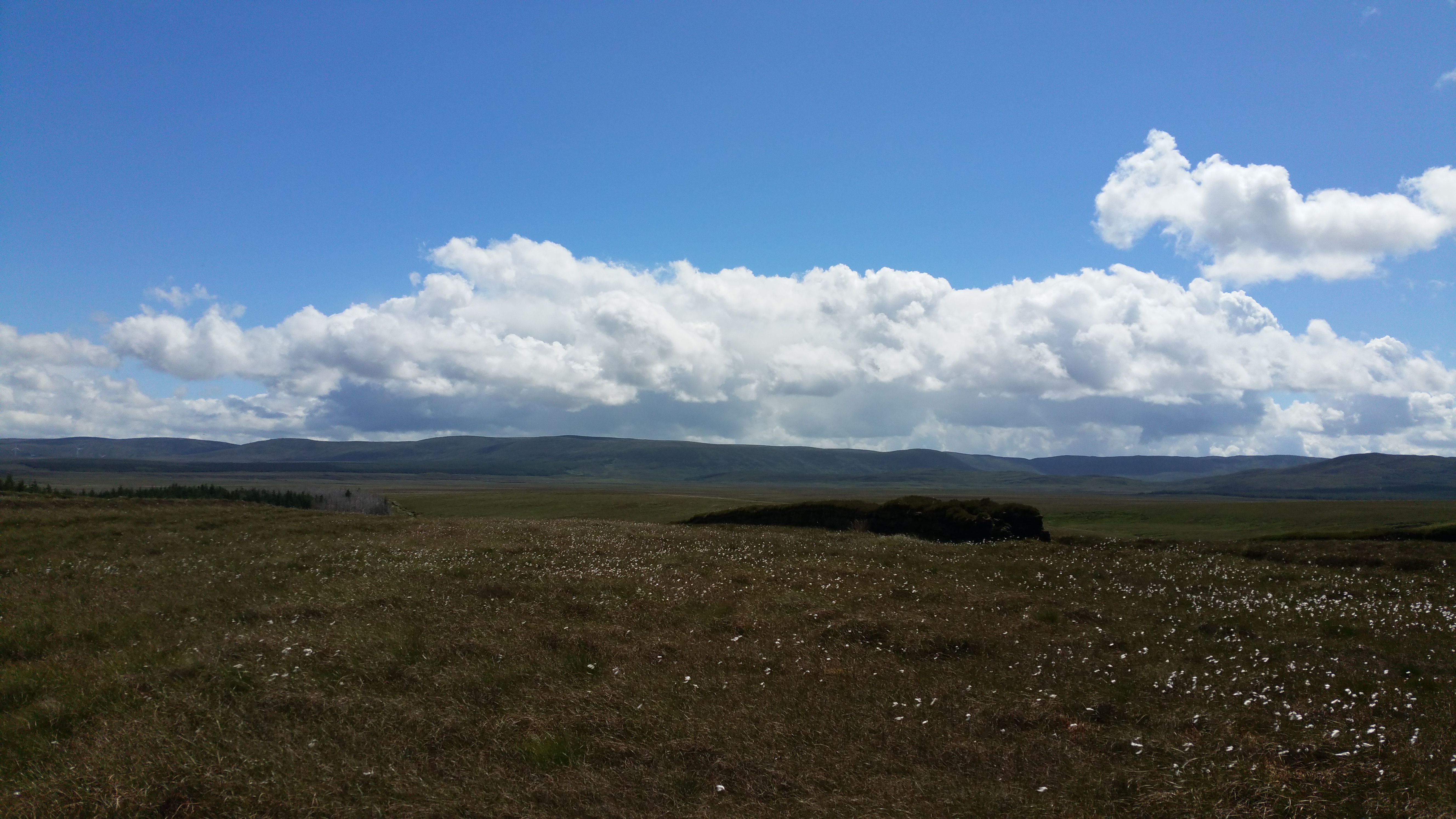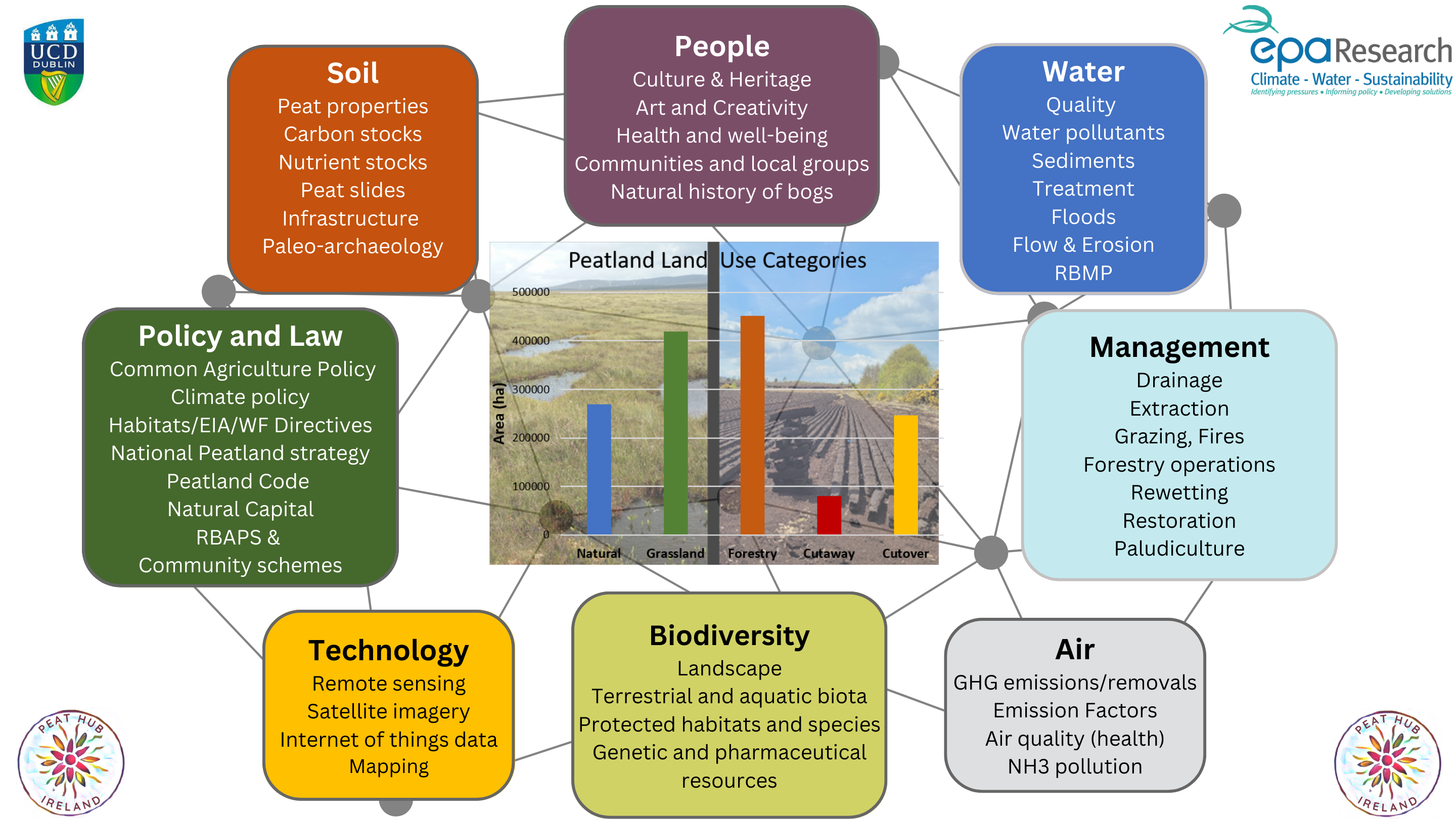At the heart of the sustainability challenges lies the problem of managing ecosystems, such as peatlands under a) uncertainty, and b) plurality of perspectives and values.
We will (1) gather multi-disciplinary knowledge, drawing on specialist (intra-disciplinary) expertise, identifying trends, risks and opportunities but also knowledge gaps, and (2) connect the resultant knowledge into an integrated form that supports decision-making at the policy, management and community levels.
Peatland research is a complex multi-disciplinary field with concepts that span many spatio-temporal scales and multiple levels of organisation and processes. Seamless access to this knowledge is typically difficult, as such retrieval usually relies on ad-hoc use of keywords used by the data owner. Each discipline and stakeholder group employ their own terminology and terms that may not be defined or used consistently even within a jurisdiction, such as the island of Ireland. This is confounded by the fact that peatlands are dynamic systems that have evolved over time along with human disturbances producing unique and sometimes novel ecosystems. Therefore, this review will require an organic approach that employs multiple strategies to develop rigorous methods for the location and interpretation of relevant information from all stakeholders.

The specific objectives of this project are:
- To compile a glossary of terms associated with peatlands and contextualised for Irish stakeholders.
- To develop rigorous methodologies (identification of stakeholders and different survey techniques) to source, compile and validate all available information.
- To map, analyse and synthesise the data, identifying linkages and gaps, while complementing the expert knowledge from emerging research from international studies.
- To generate factsheets on identified research topics to present trends, risks and opportunities.
- To deliver an initial database of collected information and to identify the requirements for a long-term repository of peatland knowledge in Ireland for all audiences, as well as establish links to international databases.
- To make recommendations to support sustainable peatland actions, dovetailed to various governmental institutions in order to inform policy development and implementation across the various sectors.
It is time to assess all the research carried out on Irish peatlands over the last 20 years and explore current and future challenges through the lens of progress on the path to sustainability. Such analyses will initially collate, map and join all past and present research and, therefore, will be synthetic (i.e. the establishment of a new construct informed by multiple types and scales of data). It will link the research knowledge to the four constituents of sustainable development and their associated targets, appraising the signs that Irish peatlands are either heading away or towards them. As peatlands must be addressed in a fundamentally multi/trans-disciplinary way, evidence will be drawn from all disciplines: ecology, hydrology, soil, atmosphere, geomorphology, paleo-archaeology, policy, law, socio-cultural and economic (Figure 1).

While each discipline has informed management decisions, these are rarely combined to understand their synergies or dis-synergies: for example, how rewetting peatlands can have the greatest impact on the reduction of greenhouse gas (GHG) emissions and provide biodiversity benefits was addressed in a paper by two members of the Project Team [7]. However, many such questions remained unanswered, for example: How do peat properties and the spatial distribution of drains
influence water quality and affect downstream floods? How can paleo-archaeological archives preserved in peat inform us of the impact of land use change and duration of impacts on climate change?
Thus, a holistic synthesis is required as peatlands can never be reduced to one of its elements (and therefore one discipline) but must be comprehended as a complex system: the whole being more than the sum of its parts. Analysing, mapping and joining up the knowledge from various disciplines and various sources, looking at synergistic effects, will deliver a clear picture of the trends and risks associated with Irish peatlands while providing expert knowledge on opportunities. Furthermore, such analyses will identify knowledge gaps and uncertainties, thereby informing and shaping the next decade of peatland research in Ireland. This analysis will be presented within a global perspective where emerging research and practical peatland work in the temperate climate zone can provide essential guidance. Thus, this project will deliver a cohesive evidence base for supporting peatland action and informing policy development and implementation.
Peat-Hub-Ireland is an EPA Research 2030 project co-funded by DAFM


This project is funded under the EPA Research Programme 2021-2030 and co-funded by the Department of Agriculture, Food and the Marine. The EPA Research Programme is a Government of Ireland initiative funded by the Department of the Environment, Climate and Communications.
DISCLAIMER: Although every effort has been made to ensure the accuracy of the material contained on this website, complete accuracy cannot be guaranteed. Neither the Environmental Protection Agency nor the authors accept any responsibility whatsoever for loss or damage occasioned or claimed to have been occasioned, in part or in full, as a consequence of any person acting or refraining from acting, as a result of a matter contained on this website.
